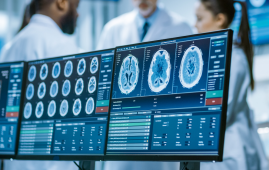

Researchers at FutureNeuro, the Research Ireland Centre for Translational Brain Science, and RCSI University of Medicine and Health Sciences have devised a revolutionary method for profiling gene activity in the living human brain in partnership with worldwide partners.
This novel technique, described in JCI Insight, provides new pathways for understanding and treating neurological diseases such as epilepsy.
Studying gene activity in the brain without intrusive tissue samples obtained by surgery or post-mortem donation has long been a difficulty in neuroscience. The researchers were able to obtain a’snapshot’ of gene activity in the living brain.
These electrodes, which are routinely used to pinpoint seizure activity in patients and enable surgical procedures, offer a unique chance to relate brain activity to the genes that are turned on or off in specific locations. The study shows how combining molecular data with electrical recordings of seizures can improve our understanding of the brain’s seizure networks, potentially boosting the accuracy of epilepsy procedures.
Research
This study represents a significant advancement in epilepsy research, providing a method to detect active genes within the living brain of individuals with epilepsy. This technology has the potential to complement traditional brain imaging and EEG tests that measure electrical activity in the brain, offering valuable insights to guide surgical decision-making in the treatment of those with epilepsy.”
Professor David Henshall, Director of FutureNeuro and Professor of Molecular Physiology and Neuroscience at RCSI
Epilepsy affects roughly 40,000 persons in Ireland, with one-third unable to manage seizures with medication. For these people, surgical surgery is frequently the best option, but its success is dependent on precisely mapping the regions responsible for seizure activity.
Beyond epilepsy, the study provides the framework for larger applications such as Alzheimer’s, Parkinson’s, and schizophrenia studies, all of which require a knowledge of molecular processes in the living brain.
A step forward.
The study, led by Professor Henshall and Professor Vijay Tiwari, Professor of Genome Biology at the University of Southern Denmark, included a global network of collaborators, including experts from Beaumont Hospital, Blackrock Clinic, Queen’s University Belfast, the University of Southern Denmark, and the Danish Institute of Advanced Study.
It emphasizes the need of worldwide collaboration and represents a step forward in understanding how our brains function at the molecular level, providing hope for better diagnosis and treatment for people affected by neurological diseases.
For more information: Dwivedi, A. K., et al. (2024). High-resolution multimodal profiling of human epileptic brain activity via explanted depth electrodes. JCI Insight. doi.org/10.1172/jci.insight.184518.
more recommended stories
 Conversational Brain Encoding Revealed in New Study
Conversational Brain Encoding Revealed in New StudyConversational Brain Encoding Revealed in New.
 New Blood Cancer Model Unveils Drug Resistance
New Blood Cancer Model Unveils Drug ResistanceNew Lab Model Reveals Gene Mutation.
 Osteoarthritis Genetics Study Uncovers New Treatment Hope
Osteoarthritis Genetics Study Uncovers New Treatment HopeOsteoarthritis- the world’s leading cause of.
 Antibody Breakthrough in Whooping Cough Vaccine
Antibody Breakthrough in Whooping Cough VaccineWhooping cough vaccine development is entering.
 Scientists Unveil Next-Gen Eye-Tracking with Unmatched Precision
Scientists Unveil Next-Gen Eye-Tracking with Unmatched PrecisionEye-tracking technology has long been a.
 Machine Learning Predicts Early Mortality in IBD Patients
Machine Learning Predicts Early Mortality in IBD PatientsA groundbreaking study published in the.
 BRP Peptide for Weight Loss: A Natural Alternative to Ozempic?
BRP Peptide for Weight Loss: A Natural Alternative to Ozempic?The rising obesity epidemic has fueled.
 Men5CV: Hope for Ending Africa’s Meningitis Epidemics
Men5CV: Hope for Ending Africa’s Meningitis EpidemicsA landmark global health study led.
 Neuroscientists Map the Brain’s Speech & Language Pathways
Neuroscientists Map the Brain’s Speech & Language PathwaysA groundbreaking study has revealed how.
 Chronic Cocaine Use Increases Impulsivity, Study Finds
Chronic Cocaine Use Increases Impulsivity, Study FindsA recent study published in eNeuro.

Leave a Comment